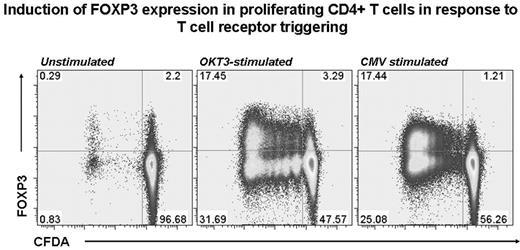Abstract
Recent data suggest that CD4+CD25+FOXP3+ regulatory T cells (TR) can be generated from CD4+CD25−FOXP3− T cells in the periphery. We studied the induction of CD4+CD25+FOXP3+ T cells during the course of immune responses to cytomegalovirus, tetanus toxoid, purified protein derivative and streptokinase. Peripheral blood mononuclear cells (PBMC) from healthy donors were labeled with carboxyfluorescein diacetate, succinimidyl ester (CFDA) and stimulated with antigen for 6–7 days. Cells were stained for CD3, CD4, CD25, HLA-DR, CD38, and intracellular FOXP3. Responders to antigens had proliferating (CFDA[dim]) CD4+ T cells expressing CD25 and the activation markers CD38 and HLA-DR. In PBMC from five donors, a median of 37% (range 9–57%) of the proliferating fraction expressed FOXP3 (figure) which mostly co-expressed CD25, HLA-DR and CD38, suggesting that FOXP3 expression is the consequence of cellular activation triggered through the T cell receptor. Since all of these healthy subjects had circulating, pre-existing CD4+CD25+FOXP3+ T cells in the absence of ex vivo antigen stimulation, however, it was possible that these gave rise to the FOXP3+ responder cells. Antigen stimulation of PBMC from three donors aged 69–70 years with no detectable CD4+CD25+FOXP3+ T cells also induced proliferating activated CD4+CD25+FOXP3+ T cells, excluding the possibility that a pre-existing pool of FOXP3+ T cells gave rise to this population. Subsequently, we sorted CD4+ T cells that proliferated in response to antigen by flow cytometry on the basis of FOXP3 expression to sequence the T cell receptor-β CDR3 regions and to establish the T cell clonotype structure of proliferating FOXP3-positive and -negative T cells. These data also indicate that effector CD4+ T cells acquire FOXP3 expression during the course of an immune response. Based on these and previously reported findings, we propose that the acquisition of FOXP3 expression by effector CD4+ T cells is a natural consequence of antigen recognition that serves as a specific regulatory feedback system.
Induction of FOXP3 expression in proliferating CD4+ T cells in response to T cell receptor triggering
Induction of FOXP3 expression in proliferating CD4+ T cells in response to T cell receptor triggering
Disclosure: No relevant conflicts of interest to declare.
Author notes
Corresponding author


This feature is available to Subscribers Only
Sign In or Create an Account Close Modal